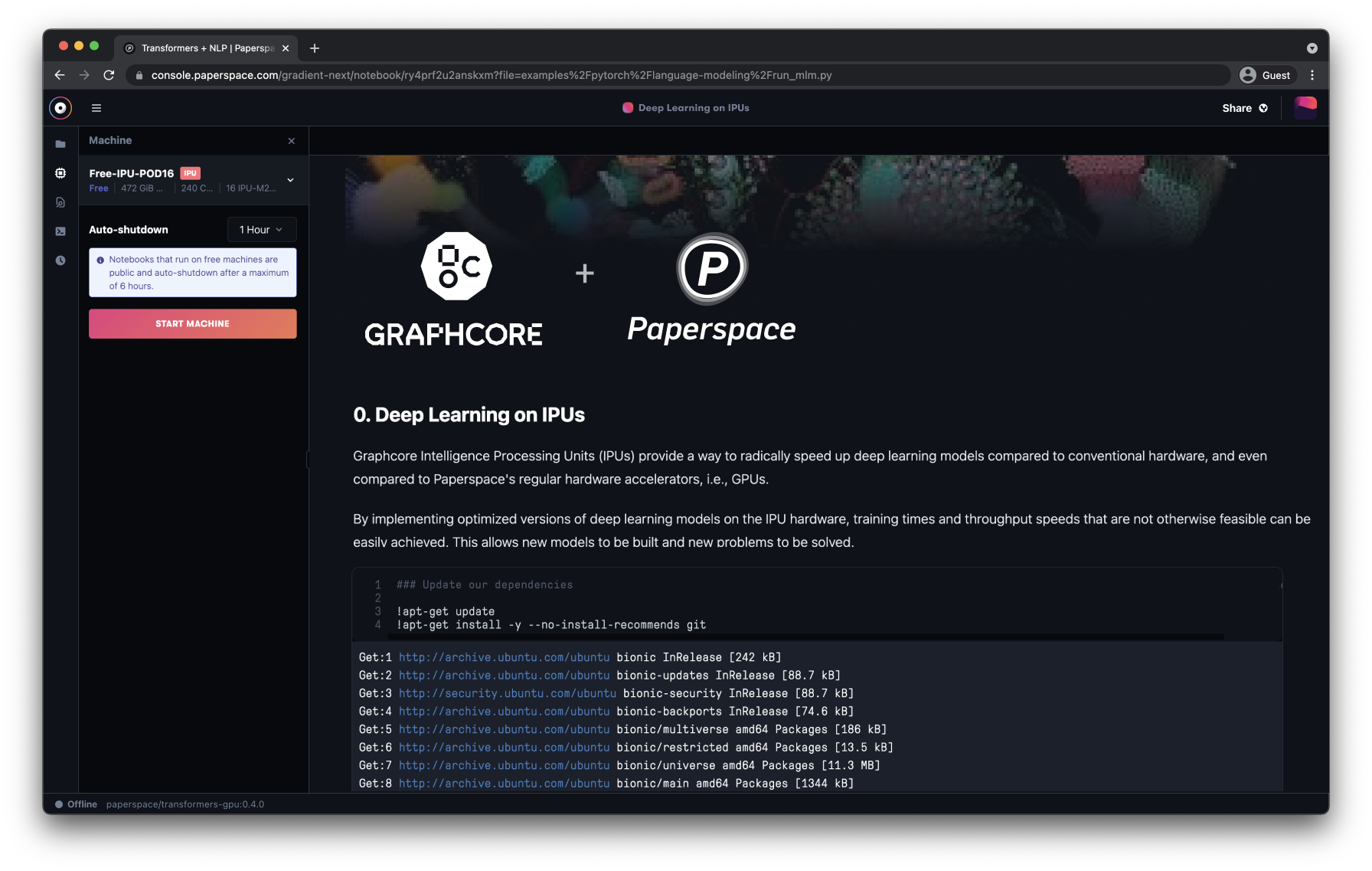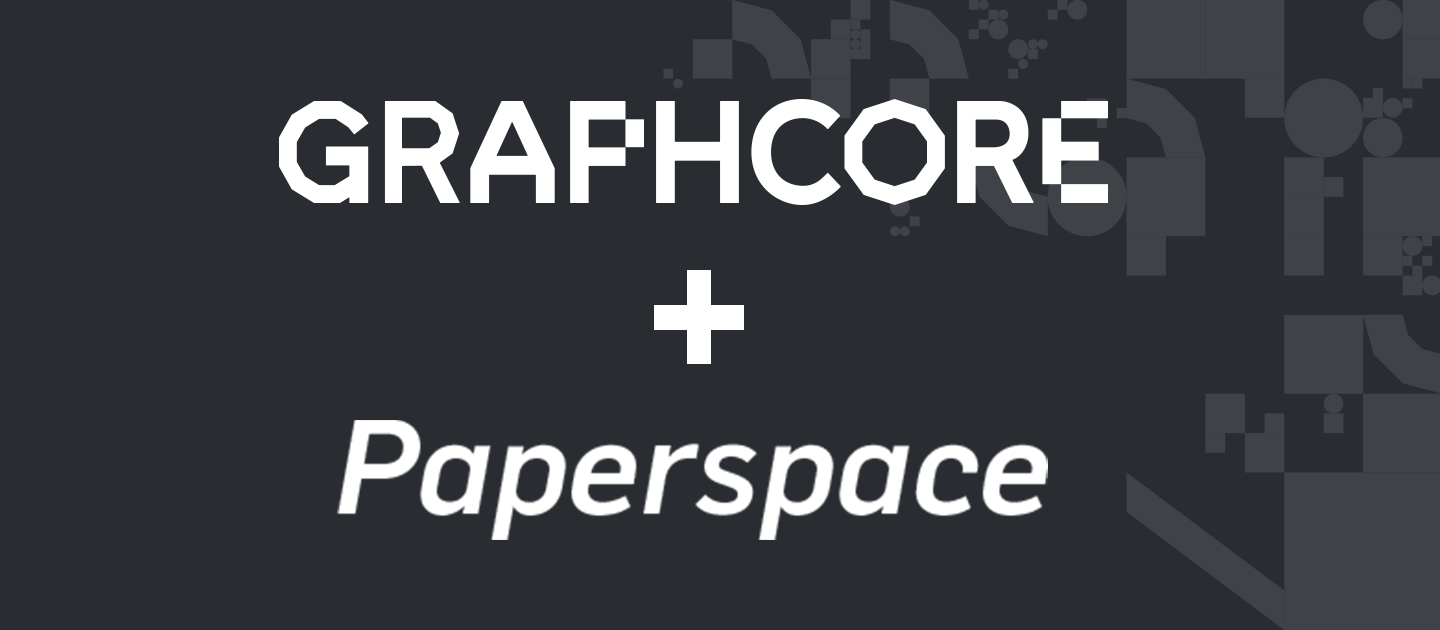- Get started on Graphcore IPUs in seconds with a zero-setup cloud Notebook experience from Paperspace.
- Access a range of IPU-ready ML models and tutorials, including code examples and learning content.
- Discover and experiment with a powerful dedicated Graphcore machine with 16 IPUs and 4 petaFLOPS of AI compute.
Paperspace, an industry-leading MLOps platform specialising in on-demand high-performance computing, has put Graphcore’s Intelligence Processing Units (IPUs) within reach of machine learning developers and researchers in a matter of minutes, for free. Launching today, the service will provide dedicated IPU access natively within Gradient—Paperspace’s platform for building, training, and deploying machine learning models.
Machine learning infrastructure management is notoriously complex and time consuming to manage. In line with its mission of making cloud computing more accessible, Paperspace abstracts away infrastructure through a simple software layer, free from installation, configuration, and compatibility issues.
Any Paperspace user can now effortlessly run state-of-the-art models on Graphcore machines in the cloud with pre-configured IPU-optimised runtimes. This eliminates the need to install drivers and SDKs, or run setup scripts to get started. Developers worldwide can now run Graphcore tutorials and sample projects to explore the advantages of the IPU’s unique AI-focused architecture and the Poplar SDK.
“Paperspace has long been known as the cloud platform of choice for ML developers and is gaining significant traction with AI engineers working in AI-first platform companies, scale-ups, and large enterprise businesses, which makes it a great partner for Graphcore. This partnership is a win-win for the machine learning community, combining the proven performance advantages of Graphcore’s IPU technology with the ease of access and powerful development environment provided by Paperspace’s Gradient cloud platform,” said Graphcore co-founder and CEO Nigel Toon.
“The joint offering we are launching today provides the perfect way to learn how to optimise models for an IPU and to experience AI applications where the IPU really shines, like Graph neural networks and Transformer models for vision and natural language processing, all in an easy to use Jupyter notebook environment.”
Run state-of-the-art models on IPU with browser-based Gradient Notebooks
From start to finish, setting up IPU access with Paperspace has been designed to be simple—and it all happens in pre-built Docker containers through the intuitive and familiar browser environment of Gradient Notebooks, a web-based Jupyter IDE.
Jupyter Notebooks are one of the most popular data science tools. Gradient supercharges Jupyter into a full-fledged IDE and MLOps platform that is powerful, flexible, and easy to use.
To get started, simply select an IPU Runtime within the Gradient workspace which comes with pre-loaded docker container, code, and datasets. Users can access a curated list of the latest and greatest models showing the advantage of IPUs—including NLP, Computer Vision, and GNNs.
Users can browse and replicate a range of published model benchmarks out of the box without having to worry about setting up their development environment. This has been made even easier through the integration of a “Run on Gradient” button linking directly from the Graphcore Model Garden.
Available models include:
- BERT-Large—an NLP transformers model for sequence classification, named entity recognition, question answering, multiple choice and more
- RoBERTa—based on BERT with modified key hyperparameters, removing the next-sentence pretraining objective and training with much larger mini-batches and learning rates
- ViT (Vision Transformer)—a computer vision model for image recognition that employs a Transformer-like architecture over patches of the image
- Cluster-GCN—an efficient algorithm for training deep and large graph convolutional networks that performs node classification tasks with cluster sampling approach to enable large-scale training
- TGN (Temporal Graph Network)—a GNN model developed at Twitter for deep learning on dynamic graphs that can be represented as a stream of events
- SchNet—a GNN-based model developed for modelling quantum interactions between atoms in a molecule
For those who want to do more, Gradient provides the ability to configure the advanced settings to load up any GitHub repository (including those from Graphcore’s developer portal, community code, or personal repositories), and pair it up with any of the official Jupyter Docker containers available through Graphcore’s Docker Hub.
Explore powerful IPU technology—with no upfront commitment
Paperspace eliminates the need to work with on-premise hardware or set up and maintain a work environment. Plus, since it’s free there is no need to commit to a future paid subscription of any kind.
Gradient Notebooks provide users with freedom to evaluate the performance and software ecosystem of Graphcore’s IPU technology at their own pace: one dedicated IPU instance can be run at a time, for up to six hours. Users can run an unlimited number of these six-hour free sessions.
All IPU-enabled Gradient Notebooks are powered by IPU-POD16 Classic machines delivering 4 petaFLOPS of AI compute.

Growing the Paperspace Gradient IPU experience
Today’s launch of this free cloud service marks the first step towards bringing the full range of IPU capabilities into the Paperspace Gradient platform. In the near future, Graphcore and Paperspace will expand their joint offerings to provide an end-to-end experience for IPUs to be used for both experimentation and production.
This will include pay-as-you-go options enabling extended support for Notebook-based IPU usage in different IPU POD systems. This will enable users to train their own models and run their own experiments on IPUs, productionise model training and inference, and optimise runtime and algorithms that suit the compute requirement of their workload.
Sign up
Sign up for free IPU access on Paperspace Gradient here.
Getting started resources
A range of popular tutorials and code examples has also been made available as Gradient Notebooks for fast and easy start-up.
